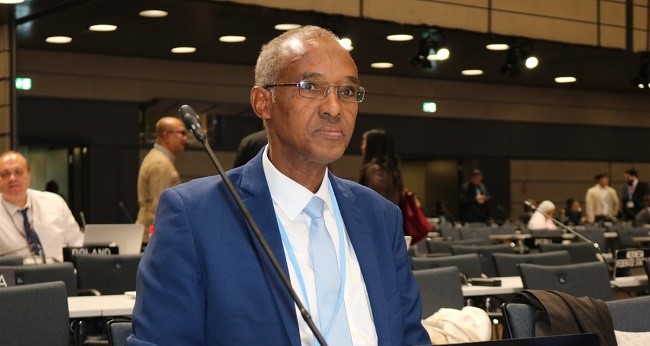Amb Ali Mohamed, Kenya’s Special Envoy for Climate Change and Chair of the African Group of Negotiators, on Saturday, November 24, 2024, responds to the latest text on the New Collective Quantified Goal, and warns that time is running out for negotiations

As the world awaits the outcomes of the COP negotiations in Baku, Amb Ali Mohamed, Kenya’s Special Envoy for Climate Change and Chair of the African Group of Negotiators, reiterates Africa’s steadfast commitment to securing an ambitious, inclusive, and equitable New Collective Quantified Goal (NCQG), and expresses readiness to reach a meaningful agreement that addresses the needs of vulnerable nations while cautioning against proposals that risk undermining the core principles of the Paris Agreement.
Amb Mohamed says: At this 11th hour of the COP – with an extra day, we must have inclusive approaches so that no Parties are left behind. As African Group, we are prepared to reach agreement here in Baku, and indeed we must reach an ambitious agreement in all respects, but we are not prepared to accept things that cross our red lines.
Disappointed with suggestions in the current bridging proposal
Amb Mohamed calls on all Parties to adopt an inclusive approach, ensuring no country is left behind in the decision-making process. At the same time, he expresses disappointment with aspects of the current bridging proposal from the COP Presidency, noting that it fails to adequately reflect the priorities and positions of developing nations, particularly those most vulnerable to climate change impacts, such as Least Developed Countries (LDCs) and Small Island Developing States (SIDS).
Key concerns with the draft proposals
The African Group raises several concerns regarding the latest text, including:
1: Equity in climate finance responsibilities: The African Group rejects provisions suggesting that African countries could contribute to the NCQG, emphasising that the goal must remain a commitment by developed countries to mobilise resources for developing nations. This is consistent with the Paris Agreement and the precedent set by the $100 billion goal.
Amb Mohamed says: We call for our partners to show greater flexibility, and to respect a comprehensive reading of the Paris Agreement. In reaction to the NCQG bridging proposal from the Presidency, the African Group is deeply disappointed and unable to work with certain elements. In particular, the elements of the formulation of the goal that would render African countries contributors to the new goal, remain deeply problematic and unacceptable.
2: Inadequate quantum of finance: The proposed quantum of $300 billion falls far short of the estimated $5.1–6.8 trillion needed for climate action by 2030. Adjusted for inflation, this figure is even lower than the $100 billion promised in 2009. Such an insufficient target undermines the aspirations of developing countries and risks repeating the shortcomings of previous goals.
3: Clarifications on terminology and mandates: The African Group emphasises the need for clarity in the draft text, as follows:
Amendments to Paragraph 5 to prioritise the evolving needs of vulnerable nations.
Deletion of ambiguous language in Paragraph 7 that lacks actionable meaning.
Opposition to redefining the mandate of International Financial Institutions (IFIs) in Paragraph 23, ensuring their focus remains aligned with mobilising climate finance.
4: Defining financial instruments and sources: In Paragraph 8, the African Group calls for a clearer articulation of financial instruments, explicitly including grants, non-debt instruments, and concessional finance. It also opposes the inclusion of all outflows from Multilateral Development Banks (MDBs), recommending that only climate finance-related flows be considered.
5: Ensuring transparency and accountability: The Group calls for the NCQG review process (Paragraph 33) to prioritise quantifiable financial targets before addressing qualitative elements, ensuring transparency in the implementation of commitments.
Proposals for improvement
The African Group proposes alternative language to strengthen the text, including:
• Replacing ambiguous provisions with specific, action-oriented language derived from the Paris Agreement.
• Addressing gaps in the draft, such as the omission of critical financial instruments.
• Reflecting the needs and priorities of the most vulnerable nations in all aspects of the NCQG.
A warning against regression
The African Group cautions against a repetition of past failures, such as the inadequate implementation of the $100 billion annual goal, which would undermine the delivery of the Paris Agreement’s aims. We are deeply concerned about proposals that would lead to a regression in global climate finance and risk the effectiveness of the NCQG.
Our commitment to constructive engagement
Despite these concerns, we, the African Group, reaffirm our willingness to engage constructively to reach an agreement in Baku, and call on all Parties to demonstrate flexibility, uphold the principles of equity and fairness, and ensure that the NCQG reflects the realities of developing nations.
We urge all Parties to remember the vulnerable communities who look to us for action. We stand ready to work toward an ambitious and equitable agreement in Baku, but we cannot compromise on principles that protect the interests of developing countries.
